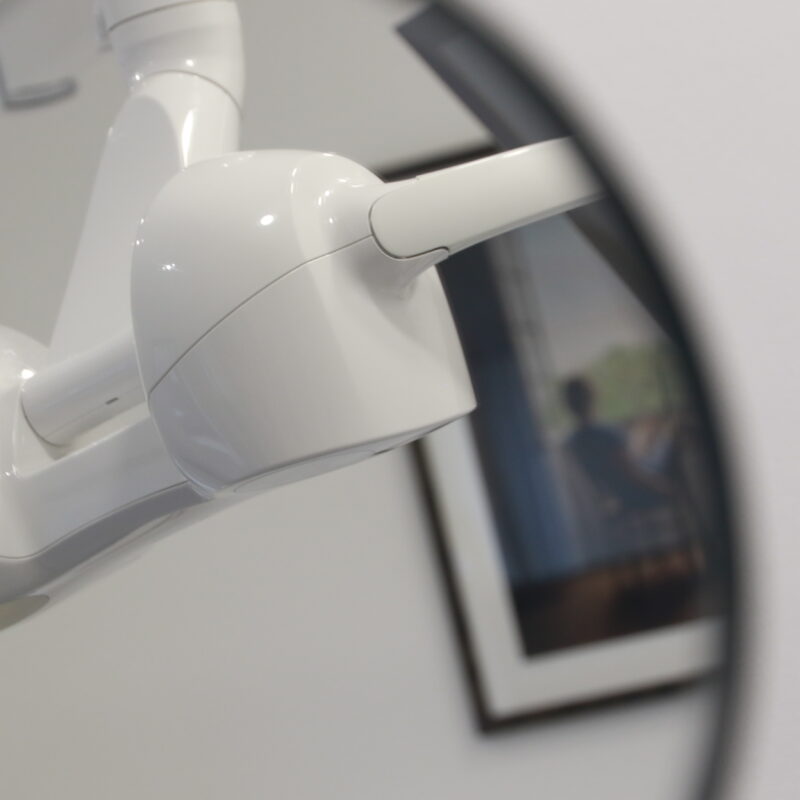
... and a multitude of other questions answered.
Root and canal, two words that seem so inoffensive when they sit by themselves, when put together they seem to instil fear in the best of us.
One of the problems is that a root canal is needed to resolve a painful tooth, so the problem, the toothache is associated with the treatment, the root canal treatment, that actually provides pain relief.
Wouldn't it be great if we could dispel the myth around root canal dental treatments, and that often starts with having a better understanding of what it is all about.
This blog is designed to help you understand what a root canal is, what the main causes are, how to know if treatment is needed, what the treatment involves and if it is painful, and what happens after the root canal has been completed.
So, let's start at the beginning...
What is a root canal?
In a way, a root canal is a misnomer. When we talk about a root canal we usually mean a form of dental treatment. To a dentist, a root canal is part of the naturally occurring anatomy of a tooth.
A tooth is formed of several parts - the crown of the tooth, which is the visible part of the tooth above the gum, and the root (or roots) of the tooth, which, in good health, are not visible, and hidden under the gum and in the jaw bone.
The crown is made of enamel, the hard outer shell, and dentine, the softer inner part of the tooth. There is a hollow chamber within the tooth. The root or roots are also made of dentine, and similarly have a hollow chamber, or canal, or sometimes several canals, within them. These canals join with the hollow chamber within the crown of the tooth, which is known as the pulp chamber.
Our teeth are alive. They have a nerve and blood supply. Blood and nerve vessels enter the tooth from the bone through the tips of the roots, or sometimes other areas of the roots, running through the root canals, and joining together into the pulp chamber, within the crown of the tooth. The nerve endings sit within the dentine throughout the tooth - both on the crown and the roots.
Root canal therapy, also known as 'endodontic treatment', a 'root filling' or even 'microsurgical endodontics', is a dental procedure that involves placing a special filling material within the roots of the tooth. In order to be able to place the filling into the roots, the roots have to be carefully prepared and disinfected.
There are many different types of techniques used to prepare teeth for root fillings. The determining factors may be the accessibility and shape of the roots, the tools and materials available to the dentist, and the dentist's expertise.
Root canal therapy is often carried out by dentists specialising in this type of treatment only.
What can cause a root canal?
Understanding the anatomy of a tooth goes someway to providing an answer to this question.
We know the teeth are alive - they have a nerve and blood supply. If anything causes the nerve or blood supply or both to be interrupted, a root canal treatment is needed.
Typically, the process of damaging the nerve and blood vessels involves the introduction of bacteria into the pulp chamber of the tooth. How can this happen? The most common ways are as follows:
- Tooth decay, or dental caries, is caused by bacteria. Once into the dentine, the bacteria consume the tooth itself, creating more bacteria and a larger area of decay. Deep decay in the tooth which extends near or into the pulp chamber, can cause irreversible damage to the nerve and blood vessels. Even if the decay is fully removed, and after a filling is placed, the bacteria will still be present, and may, quickly or slowly, kill off the nerve and blood vessels.
- A fracture or cracks extending deep into the tooth also introduce bacteria into the pulp chamber of the tooth, also causing irreversible damage to the nerve and blood vessels.
- Gum disease is caused by bacteria. This can lead to bone loss, and expose the roots of the tooth to bacteria, which can mean the pulp chamber becomes inflamed and the nerve and blood vessels die off.
- Tooth wear, when extensive enough or quick enough, can result in bacteria entering the pulp chamber of the tooth. This process is often due to erosion (something acidic) either in the diet or caused by reflux, and is quite common in people who have eating disorders. Tooth grinding or clenching (bruxism or parafunctional habits) can also cause this, as can habits such as nail biting or chewing on pens, and so on.
Sometimes the primary cause of the inflammation is not due to bacteria, but some other irritant to the nerve and blood vessels within the tooth, causing them to die off, though an infection will later follow. Events that can necessitate root canal treatment in this way include:
- Trauma, as in some sort of accident
- Tooth grinding or clenching
- Severely worn teeth
- Repeated or extensive dental treatment
- Orthodontic treatment, or braces, can sometimes cause a tooth or teeth to lose healthy nerve and blood supply
Finally, root canal therapy may be an elective treatment. Why would someone choose to have a root canal? Reasons are less common but include:
- Persistent sensitivity that interferes with normal function such as eating or eating.
- Where there is little tooth left to attach filling or crown to, a post can be placed into one or more of the roots of a tooth, anchoring the filling or crown. For this to be done, a root canal filling has to be placed first.
There can be other reasons root canal therapy is required, but these lists cover the most common causes.
How do you know if you need a root canal?
It is not always possible to know that a root canal is needed, however most of the time there are tell tale symptoms. sometimes these symptoms are more obvious, and sometimes the symptoms come and go.
The process of the death of the blood and nerve vessels within the pulp chmaber can be slow or quick. An infection follows, and this usually encompasses the tips of the roots of the tooth. This area of infection grows in size over time. When the nerve and blood vessels die, the tooth may become more brittle.
What you may see or feel, are as follows:
- a change in colour of the tooth, often to a grey or purple hue
- pain on biting
- sensitivity, both acute and mild, to temperature changes, ie hot and cold
- the tooth may feel slightly raised, and there may be a contact on that tooth first
- persistent tooth ache
- a throbbing sensation, lasting many minutes or several hours
- pain that is difficult to locate or attribute to a tooth (or to any teeth)
- swelling or tenderness of lymph nodes in the neck, which may cause pain on swallowing and to touch
- issues with balance
- referred pain to the sinuses, jaw joint or ears
- swelling around the tooth
- a sinus or pimple in the gum that pops from time to time
- a bade taste, or pus visibly draining from in or around the tooth
- a big hole in a tooth
- pain or discomfort on pressing or tapping the tooth
- a loose tooth
- pain or a bruised feeling when pressing the gums or cheeks around the tooth
Again, this list is not exhaustive, but covers most of the common causes.
You may have an idea or inkling that you need a root canal treatment, but the only way to know for sure is to see a dental professional to have a diagnosis made.
Why do you have to have a root canal?
Well, when you are in acute or severe pain, the pain determines that you will want to have a root canal treatment!
Sometimes though, the pain is less severe, or tolerable or there may be little or no symptoms. Why should anything be done if it feels ok? As covered above, all teeth needing root fillings are infected, even if infection isn't the original cause of the problem.
Once the tooth has died, the bacteria freely live inside the tooth - sounds horrible, it sure is. The bacteria invade your body from your tooth, causing a localised infection in the jaw bone. The body responds by removing jaw bone, and building blood vessels to try to combat the infection.
This process is ongoing until the source of the infection is removed, meaning the area of infection becomes bigger and bigger. More and more jaw bone is removed, a cyst can form, and other teeth can be involved. When left long enough, it may no longer be possible to treat a tooth with a root canal therapy and the tooth may need to be removed. As the process continues, there will be recurrent abscesses, the teeth can move out of line, there may be facial swellings, it may not be possible to eat freely. In a worst case scenario, when left long enough, many teeth and parts of the jaw bone may need to be removed!
Having these localised infections also have an effect on your body as a whole. Your bodies immune system is weakened, these infections are linked to heart disease, and your ability to recover from other illnesses or surgery may be compromised, and, in some cases, severely so.
If a tooth becomes discoloured due to the death of the nerve and blood vessels, the only way to effectively change the colour is to have a root canal before a bleaching process from within the tooth can be administered by a dentist.
Do root canals make your breath smell?
Teeth that require root canal treatment are, by definition, infected.
The infection may be contained within the bone and tooth, and this may cause symptoms, such as pain and discomfort, but will not smell.
It may be the infection is open in the mouth. Pus may be draining through the tooth, or the infection may have burrowed through the gum and bone and is seeping into the mouth. When this happens there may be a bad odour coming from your mouth, and that will be accompanied by a bad taste.
There will be periods when the odour or taste are worse. The body's immune system will be combating the infection and that dynamic will fluctuate, the collection of pus will increase or decrease respectively, and this will effect the amount discharged into the mouth.
Are root canals dangerous?
The process of the root canal treatment is very safe. Usually a dental dam is used to protect the tooth, and protect your mouth and airway from debris and disinfectant liquids that are used.
To have an infection around a tooth and in the jaw bone can be very dangerous. The infection can lead to sepsis (an infection in the blood stream). In the upper jaw, the infection can track back into the sinus, from there into the eye socket, and then into brain. LArge swellings from abscesses can obstruct airways. These complications can be life threatening however are rare.
There are known links of infections around teeth and heart disease.
Where there is a chronic infection in the body, such as a tooth requiring root canal, the immune system can be compromised, and this can effect recovery from and suitability for surgery.
Where there are serious, chronic illnesses, such as cancer, infected teeth needed root canal treatment can cause severe complications.
When is a root canal needed?
A root canal is needed as soon as it becomes apparent that the nerve and blood vessels of the tooth have been irreversibly damaged, or when it is identified that the tooth has already died. This may be identified during a routine dental inspection, or during an emergency appointment where you attend the dentist in pain.
The process should be started as quickly as possible, and completed within a set period of time, though sometimes that will require several visits over many weeks.
What is the process of a root canal?
The dentist will apply a numbing gel to the gum before an injection is given to numb the tooth needing treatment.
Usually a dental CT scan, a 3D scan of the tooth, is taken to show the root anatomy - how many roots there are, how many root canals there are within the roots, and how curved the roots are.
A rubber dam is placed over the tooth to protect the airway and isolate the tooth.
The dentist will then carefully remove any decay and access the roots of the tooth. A microscope will be used to identify the opening into the root canals. An assessment will be made as to whether the tooth can actually be restored (fixed).
Custom made files will be used to shape the inside of the root canals, and special liquids will be used to clean and sterilise the root canals. X-rays and special equipment are used to confirm the length of the roots, as the root filling needs to fill the whole length of the root canal.
The roots will then be dried, and filled with special root filling material - different materials are used as required for each case.
X-rays will be taken after the root canal treatment has been completed, checking whether the root canal filling material has indeed filled the whole of the roots. Periodic x-rays will be needed to check the tooth and the survival of the root filling, as sometimes recurrent infections and root fractures can occur, necessitating further treatment.
Root canals can be completed in a single or multiple appointments, depending on the presenting condition. Each appointment is usually 60 or 90 minutes. Where there are more root canals and the roots are curved and longer, more time, and potentially more appointments will be required.
If the tooth is very infected, more appointments may be needed to disinfect the root canals before the root canal filling is placed.
Do root canals hurt?
Teeth needing root canal treatment can be painful. The level of pain can vary considerably - sometimes the tooth may be just slightly sensitive to temperature, and at other times the pain may be excruciating with little relief given by pain killers. The level of pain may vary from tooth to tooth, person to person or day to day.
If the tooth is very inflamed or infected, it may not be possible to make the tooth numb - if this happens, the dentist will stop treatment and start again another day.
The process of root canal treatment is usually painless, though coming to the dentist and lying in the chair with your mouth open for long periods of time is not the most pleasant way to spend your time.
Of course, the pain relief that can be given by having a root canal is immeasurable.
Do root canals hurt after they have been completed?
After most types of dental interventions or treatments there will be some discomfort - some mild bruising, or stiffness of the jaw muscles.
There can be, but not always, symptoms from a tooth which has had a root filling, ranging from very mild symptoms, to the tooth being very tender to touch. Any symptoms are usually easily managed with painkillers, and most symptoms are gone within a few days.
How much does a root canal cost?
The cost of a root canal varies. Some teeth have more or longer roots or root canals, and this will cost more. Some teeth have complex root canal shapes that require fine, detailed work that takes longer. Teeth with very curved roots may also require more work, increasing the costs.
The experience of the dentist, and the level of training of a dentist will also have an effect on the cost.
There is a variation between NHS and private dental practice costs.
Finally, the systems and materials used, and the diagnostic tools will have a bearing on the costs.
Root fillings therefore may cost from £300 or so up to £1800 per tooth.
There will be other ancillary costs, such as x-rays, and the regular filling work to plug the hole from the top of the tooth to the roots (known as a core or a post and core). Teeth with root fillings often need to be restored with a crown, and this also adds significant cost
Who can do a root canal?
All dentist are qualified to do root canal treatments.
Just as in medicine, there are different fields of dentistry. The discipline of root canal treatments is known as Endodontics. Some dentists choose to specialise in or work only with root canals, and this type of dentist, a Specialist in Endodontics, or a dentist with a Special Interest in Endodontics, will have more experience with root canal treatments, and will probably have more specialist equipment, and are therefore able to deal with more complex cases.
Some root canal treatments are technically easier than others and these may be treated very efficiently by a general dental practitioner.
Other root canal treatments are technically more difficult, or require a greater variety of instruments, and these are better treated by a dentist with a Special Interest or a Specialist Dentist in Endodontics.
How long do root canals last?
This is difficult to answer as there is so much variety and it depends on how you define ‘success’ or ‘survival’, and ‘failure’.
Some root canal fillings may last a lifetime, but most will last, on average, 8-10 years. Some will last less than a year.
How do they fail? Often the tooth fails rather than the root canal filling. A tooth with a root canal filling is much more brittle and likely to crack or split. There may be a recurrent infection, or tooth decay. Some of these processes are painful, but most are not as a tooth with a root canal filling no longer has a nerve supply, therefore you are unlikely to be aware of a developing problem until it is quite advanced.
Is a root canal worth it?
Is it worth having a root canal treatment?
The answer is always case specific. If you have many healthy teeth, and just one tooth needs a root canal treatment, assuming the tooth is not important for chewing and not visible so that it is not an aesthetic issue, then perhaps the tooth can be removed (this is the only alternative to having a root canal filling), and may be replaced with an implant or a bridge. On the other hand, if you already have missing teeth, or other teeth are generally not in a good condition it may be very important to preserve that particular tooth.
Dental implants are much more common place these days, however there can be complications with implant also, therefore it is often recommended to try to maintain natural teeth for as long as possible.
Once the tooth is no longer viable, or the root filling is too complex or other issues have arisen as a result of the infection, then it may be more time and cost efficient to remove the tooth and plan out a next phase - replacing teeth. Sometimes an investigator process is needed to determine whether the tooth can be restored, or fixed in a predictable way, ie there is a good chance of medium or long term survival. This is always a discussion that should take place with a dentist who has knowledge of all the outcomes and options.
How long does it take to recover from a root canal?
Beyond the initial discomfort detailed above, there is little to no recovery time.
Generally speaking, the day of the treatment is probably not a good time to be making major decisions, though you can drive and operate machinery as usual.
Playing sport is not a good idea if you are still numb, and while the anaesthetic is in effect, care should be taken when eating or drinking, especially with hot drinks.
Occasionally, antibiotics will be prescribed, and in some cases alcohol must not be consumed with the antibiotics, otherwise drinking alcohol (sensibly!) is fine too.
Can you have a root canal when pregnant?
Root canal treatments can be completed at any time during pregnancy.
A careful assessment has to be made of that particular person’s needs, and the risks, and a decision can then be made.
If there is infection, or pain, or both, clearly this will need to be dealt with as soon as possible as the risks to mother and baby are higher than if the problem is left untreated.
Summary
Root canal treatments are usually a painless way to remove infection and preserve teeth. They are part of a process of restoring a tooth and other treatments and fillings will be needed to maintain the tooth in a healthy and viable condition.
Root canal treatments may also be important in allowing broken down teeth to be built up again, and allow aesthetic treatments, such as internal tooth whitening, to be undertaken.
Root canal treatments provide pain relief for teeth that are slightly or severely painful - it is a shame root canal treatments have such a bad reputation as rather than cause pain, they actually provide pain relief!
More
from the blog
Blog /Advice
Veneers Vs composite bonding
An Evidence-Based Comparison of Two Popular Cosmetic Dental Treatments
Read moreBlog /Advice
Is High-Fluoride Toothpaste Safe?
Benefits, Risks, and How It Protects Against Tooth Decay
Read moreBlog /Advice
Nutritional Effects on Oral Surgery Outcomes
Preparing Your Body for Faster Recovery
Read moreBlog /Advice
PRF facials - Platelet-Rich Plasma
Learn how platelet-rich fibrin treatments naturally restore youthful skin
Read more





